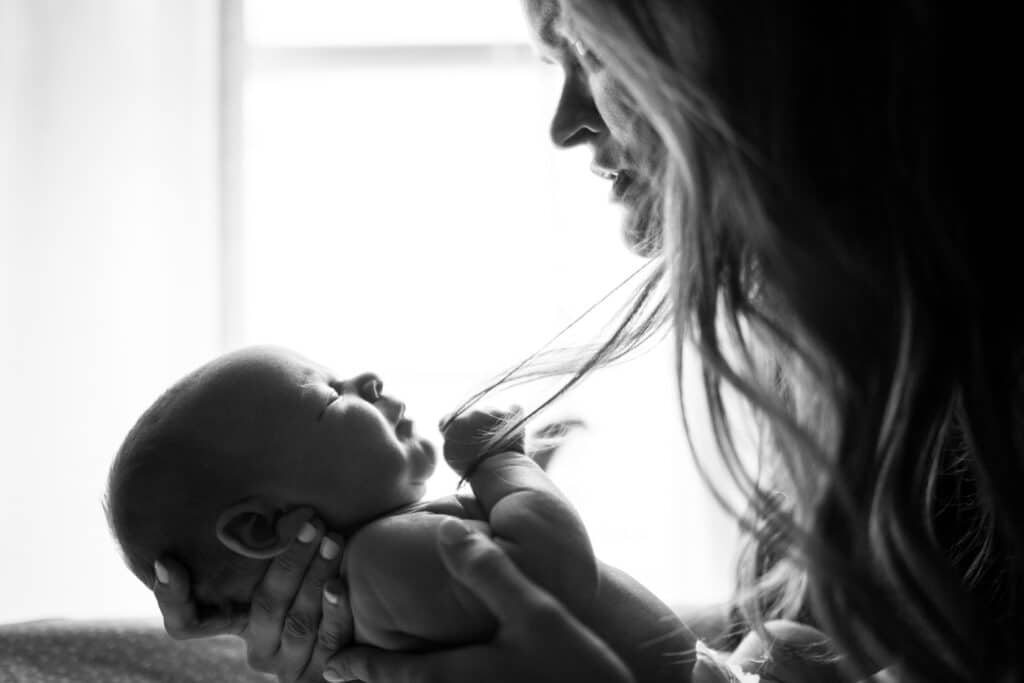What I learned Postpartum By Ali Glinsky

This week we were lucky enough to have postpartum educator and mother of two, Ali Glinsky join us for a guest blog! Ali is a wealth of knowledge and has a deep passion and understanding of the care needed postpartum. She teaches postpartum planning classes with Bay City Doulas. We hope you enjoy this week’s blog, “What I learned postpartum by Ali Glinsky.”

What I learned Postpartum
The birth of my first daughter went as planned, but coming home with our little bundle of joy came with the overwhelming pressure of wanting to do everything “right.” I still have clear memories of how it felt when leaving the hospital. It was my first glimpse into what it was going to be like as a new mother. The entire car ride home, I checked her breathing and the tightness of her car seat straps, all while holding my swollen body up. I was anxious around every corner. When home, I sat in my nursing chair with my nursing pillow and had trouble breastfeeding. All I wanted was to take care of my baby the best way possible. I was sad, and suddenly tears were rolling down my face, and the baby blues hit.
Before having my own baby, I had no idea that having a baby would affect nearly every relationship in my life. My personal postpartum experiences fueled my passion for becoming a postpartum educator, which I am today.
Four helpful tips to ease postpartum
When working with new mothers now, I often speak of key elements that can ease the often underestimated changes when a baby arrives, and a mother is born.
1. Make a postpartum plan
Just like most things, having a plan in place and not having to make on-the-fly decisions in stressful moments will be KEY to your postpartum experience. Make sure you sit down and write out what is important to you, what you value, who you can call if you need help around the house, with cooking, or help to breastfeed if that is the goal. The more names and numbers you can have in front of you when you are in crisis mode, the better.
2. Trust your body
We are often led to this idea that someone else knows better than we do when it comes to our own bodies. In regards to postpartum, this includes healing and breastfeeding and our mental health. Learning to listen and trust our bodies is so important. If you or something about your baby is not feeling right, inquire; You were meant for this.
3. Get on the same page with your partner
I highly recommend a sit down with your partner before the baby arrives to go over some logistical tasks and expectations you can agree on. Figure out what policies you will enforce with visitors and family and any outside help (i.e., vaccines, flu shots, mask-wearing, etc.) and think about your daily life and what things might fall by the wayside once the baby arrives. Often that can look like pet care, laundry, and other chores in the early days with a newborn. What are some tasks you can outsource, or your partner can pick up from you during the first few weeks to lighten your load while you recover? Talking about these things early and often will relieve some of the stress having a new baby brings naturally between couples.
4. Take time to take care of yourself
Having a baby is one of the biggest, if not the biggest, life changes you will encounter. Create some weekly check-ins with yourself and see how you are doing. If your plate is feeling full, ask for help. An important thing to remember is although something may seem obvious to you, it might not be to someone else. Ask for what you need directly and open the line of communication.
Bonus tip: Considering hiring a postpartum doula
I was gifted a postpartum doula for a few days a week, and it was wonderful. My doula took such great care of me, answered my questions, and held my baby, so I could shower and get a nap in. She also cooked and nourished our whole family. I am forever grateful for this gift and love the support Bay City Doulas provides to families.
Thank you for reading!
I care so deeply about the postpartum experience and do this work. Although we cannot be prepared for every change we encounter, we can set ourselves up for success in postpartum with the proper support. In the upcoming Postpartum Preparedness class, we will discuss setting yourself up for your postpartum experience with self-care, nutrition, and what the first few hours with a baby look like. We also cover postpartum mood changes and what signs to look for, as well as baby hunger cues, sleep tips for your baby as well as newborn schedules. If you have any questions about the class, please reach out! This class will be useful in any trimester as you prepare to bring the baby home. For more information, contact Bay City Doulas. Thank you for joining us in this week’s guest blog Ali! For more blogs on all things pregnancy, postpartum, and parenthood please visit our weekly blog.

